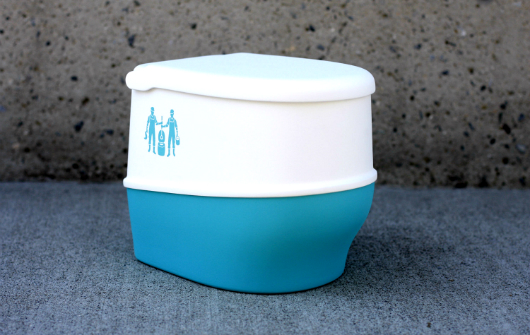Portable, Rentable Toilets: An Innovative Solution to Ghana’s Sanitation Crisis

Today, cities in Africa are rapidly urbanizing. The population is growing faster than infrastructure is being built, which causes a shortage of sewage and sanitation systems, especially in impoverished areas.
Over 2.6 billion people do not have access to sanitation. Every day, thousands of tons of feces are not disposed of properly, polluting water and spreading diseases among women and children.
Every year, 1.8 million people die from waterborne diarrheal diseases. Ninety percent of these deaths are children under five-years-old.
Clean Team Ghana has made it their mission to fix this sanitation crisis. The company has invented an inexpensive toilet service to help low-income citizens.
“People of all ages, regardless of circumstance, deserve the right to perform their necessary bodily functions in safety, without the risk of spreading or contracting disease. Our mission is to ensure as many people as possible can enjoy that right,” explains the company’s website.
Kumasi, where Clean Team Ghana has focused its efforts, is Ghana’s second-largest city; here, rapid urbanization and development issues are rampant. Unplanned slum areas do not have any type of sewer system. Half of the population of Kumasi uses public toilet blocks.
According to How We Made it in Africa, public toilet blocks are “often over-burdened, poorly maintained and unhygienic. Those that cannot brave the stench would prefer to do their business openly–or in packets that are then thrown into gutters, polluting water supplies and causing diseases such as cholera.”
Families without proper sewage can rent out Clean Team Ghana’s portable toilets, which the company installs and treats three times per week, exchanging the used canister for a fresh one. The dirty canister is treated at a processing site and reused.
One toilet provides service to five to seven people, and only costs $2.50 to install. The service costs a family $8.90 a month for one toilet. Clean Team Ghana offers weekly payment services, as very few customers earn monthly salaries.
“Most of our customers are traders and earn daily sums of money, maybe even weekly sums. So we have account managers who visit these customers at least once a week so they can pay in bits,” said Clean Team Ghana CEO Abigail Aruna.
The toilets are odorless: the company uses chemicals to mask the smell. They do not require water or pipes, only some space.
So far, Clean Team Ghana has installed over 1,000 toilets across Kumasi. The company aims to install 1,500 more by the end of 2015. Clean Team Ghana markets their toilets by going door-to-door in settlements and explaining how the toilet works.
Aruna believes that in the next few years, Clean Team Ghana can install 10,000 toilets in Kumasi. Once they reach 10,000, the company plans to expand to other cities in Ghana.
“Research is ongoing around that. There are regional differences and we will take them into consideration before we expand. The situation in Kumasi is quite different from the situation in Accra or in Tamale, or in other towns,” explained Aruna.
Clean Team Ghana began when the nonprofit Water and Sanitation for the Urban Poor partnered with Unilever, a company that produces cleaning agents. IDEO.org designed the toilets, and at the beginning of 2012, the project was funded by the Stone Family Foundation and the Bill & Melinda Gates Foundation.
“Innovative ideas like ours are really necessary in Ghana and other African countries that cannot afford to put adequate sewage systems in place in their towns and cities. So I think the future of Clean Team Ghana and other sanitation companies is very bright–and is a way forward to solve the sanitation issues in Africa for now,” said Aruna.
– Margaret Anderson
Sources: How we made it in Africa, Clean Team Toilets
Photo: Core 77
